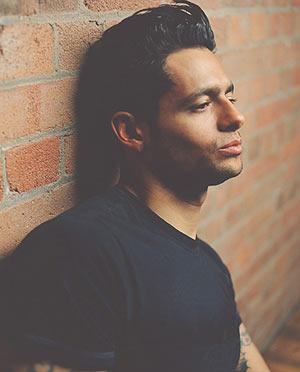|
 |
|
Esta página no está disponible en español. By Any Name, Rosa Is Provocative Musician… Aligning Passion And Principle, Rosa Keeps It Real
By Any Name, Rosa Is Provocative Musician His show `Draco Al Natural' features intimate acoustic arrangements. Fans may just want to sing along. By Jim Abbott | Sentinel Pop Music Critic 21 January 2005
Robi Draco Rosa When: 7 p.m. doors Sunday. Where: House of Blues, Downtown Disney West Side, Lake Buena Vista. How much: $19.50 advance, $22.50 day of show. Where to call: 407-934-2583. It's hard to pin a label on Robi Draco Rosa, and that's just fine with him. He's an ex-Menudo member, which puts him squarely in the pop realm. After he left the boy band in 1986, he fronted an alt-rock band, Maggie's Dream, then tackled grunge on the 1996 solo album Vagabundo. The album was lauded by Spin magazine as one of the 10 best rock en espanol albums ever. Rosa responded to all the Alice In Chains comparisons by writing and producing for Ricky Martin, putting him at ground zero of the worldwide Latin Pop explosion. Draco, who performs Sunday at House of Blues at Downtown Disney, seems to thrive on keeping his identity fluid. He's known for using a string of assumed names tailored to whatever he happens to be doing at the time. He wrote Martin's "She Bangs" as alter ego Ian Blake, a tribute to the Cult's Ian Astbury and poet William Blake. At another point, he was goth-rocker Draco Cornelius. When he wrote for Puerto Rican bandleader Ednita Nazario in 1999, it was as Dolores del Infante. "Over the years, I've found that the best way to run a career is to run it on your own terms," Rosa says by phone from Los Angeles, where he is preparing for a family vacation to Puerto Rico. Though born in New York, Rosa was raised in Puerto Rico and likes to return there as frequently as possible. "Whatever it is you are trying to create, be true to it," he says of his stylistic leaps. "Life is short; it's what it is. My freedom is priceless, and I don't want anyone telling me how I have to flow. I don't even know. When I think I know, it's always some other thing." The current thing is Mad Love, a collection of sophisticated pop-oriented songs filtered through Rosa's recent preoccupation with Miles Davis. He will showcase the material at House of Blues as part of a limited tour that also includes Panama City, Panama; Miami; New York; and Los Angeles. The show is called "Draco Al Natural," a nod to the intimate acoustic arrangements that he is using to frame songs originally recorded in a different way. "Most of the albums are electric, but this time around we're doing an all-acoustic set that should be real nice," Rosa says. "We experimented with this idea in 2004. We tried it at a coliseum for 20,000 people -- all acoustic. It was fantastic." Rosa describes the crowd reaction as a spiritual experience when fans are singing along with new versions of songs they know. "It's so quiet and people are singing along and it sounds like you're at a church." Sometimes, the audience is rowdy, which is fine, too. He loves the spontaneity of performing live. "Music is meant to be felt and not understood," he says. That was the approach behind Mad Love, which was inspired when Rosa took a long road trip on the Pacific Coast Highway listening to the Miles Davis 1969 classic Bitches Brew. Flavored by keyboards, flutes, Spanish guitars and pulsating rhythm sections, songs such as "Dancing in the Rain" find the middle ground between jazz and Sting's post-rock albums. Along the way, Rosa says that he discovered a new confidence in his singing voice, which he admits hasn't always pleased him. "Usually, I'm surrounded by such great players when I sing that I'm definitely the weakest link. I usually try to cover myself up with several backgrounds, at least my recordings in the past were like that. This time I just turned up the volume, but it's hard to love your own voice." When he's not recording, Rosa is busy supervising the business side of his career. Established in 1998, Draco's Phantom Vox (phantomvox .com) includes a management company, a publishing division and a recording studio. Although he is devoted to supporting the arts in Puerto Rico, Rosa also extends that mission internationally. Last year, he traveled to Cuba to visit high school music programs in a program put together by the nation's Ministry of Culture. Watching the students perform reminded Rosa of how music affected him as a child. "Early on, it was the only thing, the only comfort zone, the ultimate friend. Even to this day, it's the one thing that calms the spirit." Rosa keeps that in mind when critics want to define him against his wishes. "I'm fighting for music, and I'm not fighting for genres," he says. "That is key in my life. I'm criticized for it because the system is not built on that. "It's built on a genre being like a big sausage factory. Nobody wants to give you different flavors. I'm a little confused about whether it's a blessing or a curse. The fact is, it's who I am." Aligning Passion And Principle, Rosa Keeps It Real BY JORDAN LEVIN 21 January 2005
When Robi Draco Rosa and Ricky Martin started in Menudo, the Puerto Rican boy group and pop phenomenon of the 1980s, nobody was paying much attention to Martin. Back in 1985, it was the charismatic, stunningly talented Rosa everyone thought would become a star. But it was Martin whose career went steadily upward, exploding like a supernova in 1999. Rosa had left Menudo in 1986, frustrated management wouldn't let him write songs. Over the next decade he wandered Brazil and Europe, creating dark, alluring bands and albums that got great reviews but didn't sell much. He let himself get dragged down by drugs and pulled himself out. And he provided the firepower to launch Ricky's rocket, co-writing Martin's 1995 hit, Maria, and many of those that followed, including Livin' La Vida Loca -- shiny, bouncy, multimillion-selling opposites of his own complex, idiosyncratic music. But when asked whether it bothers him that his career hasn't also shot upward, Rosa, who plays South Beach's Club Macarena tonight and Saturday night, says, ``Not at all. Nothing is more extreme than Menudo, not even Ricky Martin. Staying true to music goes against having that kind of commercial success. I think I have the best of both worlds. But my essence is not up for grabs.'' FIGHT FOR INTEGRITY When Rosa's smoky, seductive album Mad Love received three 2004 Latin Grammy nominations, including Record and Song of the Year, he was offered a slot on the show if he would perform with American bubblegum-pop princess Jessica Simpson. He turned it down, even though he was told that meant he was off the telecast. ''Certain things just don't jive,'' is all Rosa will say, speaking from his home in Los Angeles. Organizers relented, and Rosa gave one of the electrifying performances that's made him an underground Latin rock legend who can fill clubs around the country and stadiums in his native Puerto Rico. Shave off the scruffy stubble and slick back the unruly hair, and Rosa, 34, has a Latin pop idol's chiseled good looks and sultry pout. But he's blunt and impulsive and uninterested in the formulas he creates for others. He loves Miles Davis, The Doors, Sly Stone and the doomed, brilliant flamenco singer Camaron de la Isla. He'll put on T. Rex in one room and Miles in the other and look for a new sound in between. For Rosa, music seems to be part religious and part psychedelic experience. ''I'm looking for that magical experience, and trying to find it is kind of scary,'' he says. ``My body temperature fluctuates. Or I see it, and it's very beautiful -- very big and powerful, kind of a dreamscape.'' His musical dream began when 10-year-old Rosa's family moved from New York to a small town in Puerto Rico. At 13, he was taken into Menudo. At first he loved the excitement and attention: His first show was at Radio City Music Hall, where he danced so hard the manager told him to tone it down. Pedro de Cordoba, who managed Menudo's first U.S. Tour in 1985, remembers an executive with RCA, Menudo's label, telling him that Rosa was the next Michael Jackson. ''Everybody thought Robi had the talent and personality, that he was gonna be special,'' de Cordoba says. DREAM DIVERTED Instead Rosa quit at 16, frustrated by the glittery grind of pumping out formulaic pop music, and by management who brushed off his first attempts at songwriting. In 1988, he starred in Salsa, where he met his wife, actor-director Angela Alvarado. (The couple has two sons, 10 and 4). In 1990, he joined funk-rock group Maggie's Dream, which toured with the Black Crowes and Faith No More but never quite made it. Rosa sank into the darker side of rock, ingesting lots of substances that he declines to name. ''Does it matter?'' he asks. ''I slipped into the cracks, the world of crazies.'' He was in and out of rehab for about a year and a half before getting his life under control. In 1995, living in a one-bedroom apartment with his wife and baby son, Rosa began writing for Martin. The result was a series of hits that lasted through Martin's 2000 album Sound Loaded. But Rosa found the glare of the pop world so bright that he initially hid behind dark shades and the invented persona of Ian Blake, an imperturbably cool Brit. ''I did that to step out of my own skin, to not be so critical,'' Rosa says. ``It was so different -- this big house, BMWs, all these beautiful people. But I'd just think I'm Ian Blake, I can hang. I learned a lot with those jobs. I also learned I didn't want to do it anymore.'' The Martin jobs (and others for Julio Iglesias and Ednita Nazario) helped finance his solo albums, 1994's Frio and 1997's Vagabundo. ''Robi has a serious natural talent,'' says Tomás Muñoz, the veteran former Sony Discos executive who has been instrumental in the careers of such artists as Julio Iglesias and Chayanne, and who signed Rosa in the early 1990s. ``He's out of the ordinary. He's one of those people who change things.'' FAITHFUL BACKING That's what Randy Phillips, president of AEG, the country's second biggest concert production company, is gambling on. AEG is producing Rosa's current tour as part of an endeavor to present talented acts they believe are overlooked by the music industry. ''We're picking those who we consider stars,'' Phillips said from his L.A. office. ``I look at him as someone whose potential is limitless.'' Rosa says he tries to stay focused on the music, not his career. ``I keep recording and hope for that one high. And every so often there's the satisfaction of hearing all this music together where there was once just barren space. So I'm true to that.''
|

 Robi Draco Rosa. (D. BARON MEDIA)
Robi Draco Rosa. (D. BARON MEDIA) Musician Robi Draco Rosa plays South Beach's Club Macarena tonight and Saturday night.
Musician Robi Draco Rosa plays South Beach's Club Macarena tonight and Saturday night.